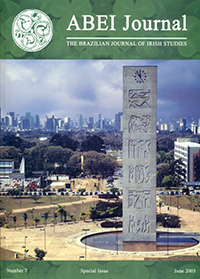On Local Disturbances: Reflections on Joyce’s Use of Language in “Sirens”
DOI:
https://doi.org/10.37389/abei.v7i1.184270Palavras-chave:
James Joyce, Ulysses, Sirens, LinguagemResumo
This article explores the issue of language in the “Sirens’ episode of Ulysses. “Sirens” begins enigmatically with “Bronze by gold heard the hoofirons, steelyringing”. Glossing this requires something more than tying it to the consciousness of the two barmaids or indeed to the wider theme of the episode. With the help of some such awkward sentences and phrases taken for the most part from the Overture or Prelude to “Sirens”, I want to consider the processes at work here and especially how they might connect with politics and the colonial encounter. In particular I focus on how Joyce translators “French, Spanish, German, Italian, and modern Greek “tackle such phrases such as ‘Imperthnthn thnthnthn”. The sounds in the Overture are often detached from meaning, or their meaning is deferred until later in the episode, or their semantic field or phonological system is peculiar to English. In wrestling with Joyce’s texts, the translators remind us of what we might describe as “local disturbances”, which surround not only the Overture to “Sirens” but Joyce’s language in general. I then complicate this idea by suggesting a possible parallel in “Sirens”“an episode which is sometimes read in terms of the 1790s when the United Irishmen attempted to break the connection with the United Kingdom and which includes repeated pointed references to the ’98 song “The Croppy Boy” “ between local disturbances in language and local disturbances in Irish history.
Referências
Gifford, Don, with Robert J. Seidman, Ulysses Annotated: Notes for James Joyce’s Ulysses, 2nd edn. Berkeley, Los Angeles and London: University of California Press, 1989.
Gordon, John, Joyce and Reality: The Empirical Strikes Back. Syracuse, New York: Syracuse University Press, 2004.
James Joyce, Ulysses. Ed Jeri Johnson. Oxford: Oxford University Press, 1993.
____. Odussšaj. Trans. Swkr£sthj Kay£sknj.Áthens: Kšdros, 1990.
____. Ulysse. Trans. Auguste Morel with assistance of Stuart Gilbert [1929]; Paris: Gallimard, 1957.
____. Ulises. Trans. J. Salas Subirat. 2nd ed. Buenos Aires: Santiago Rueda, 1952.
____. Ulises. Trans. José María Valverde. [1975]; Barcelona: Editorial Lumen, 1996).
____. Ulises. Trans. Francisco García Tortosa (rev ed) Madrid: Cátedra, 2003.
____. Ulisse. Trans. Giulio de Angelis. [1960]; Milan: Arnoldo Mondadori Editore, 1967.
____. Ulysse. Trans. Bona Flecchia. Firenze: Shakespeare and Company, 1995.
____. Ulysses. Trans. Hans Wollschläger. [1975]; Frankfurt am Main: Suhrkamp, 1981.
Lewis, George Cornewall, On Local Disturbances in Ireland and On the Irish Church Question. London: B. Fellowes, 1836.
Pierce, David, Light, Freedom and Song: A Cultural History of Modern Irish Writing. London and New Haven: Yale University Press, 2005.
Senn, Fritz, Inductive Scrutinies: Focus on Joyce (ed Christine O’Neill) Dublin: Lilliput, 1995.
Downloads
Publicado
Edição
Seção
Licença
Copyright (c) 2005 David Pierce

Este trabalho está licenciado sob uma licença Creative Commons Attribution-NonCommercial 4.0 International License.


